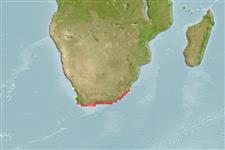Elasmobranchii (sharks and rays) >
Carcharhiniformes (Ground sharks) >
Pentanchidae (Deepwater catsharks)
Etymology: Haploblepharus: haplos (Gr.), single or simple; blepharon (Gr.), eyelid, referring to simple structure of lower eyelid, which closes against upper eyelid to protect the eye (See ETYFish); fuscus: Latin for dusky, dark or swarthy, probably referring to its overall drab-brown coloration (See ETYFish).
More on author: Smith.
Environment: milieu / climate zone / depth range / distribution range
Ecology
Marine; reef-associated. Subtropical; 30°S - 35°S
Southeast Atlantic: just west of Cape Agulhas to southern Natal in South Africa (Ref. 5578). This species is sympatric with Haploblepharus edwardsii in the southeastern Cape region but there is at least partial microhabitat separation between the two - Haploblepharus fuscus occurs inshore while Haploblepharus edwardsii occurs in deeper water offshore (Ref. 244).
Size / Weight / Age
Maturity: Lm ? range ? - ? cm
Max length : 69.0 cm TL male/unsexed; (Ref. 244); 73.0 cm TL (female)
Short description
Identification keys | Morphology | Morphometrics
Dorsal spines (total): 0; Anal spines: 0. The largest shyshark, usually plain yellowish-brown above becoming just yellowish below; small light spots and indistinct brown saddles in some specimens (Ref. 5578).
Found close inshore on the continental shelf, often in shallow, rocky areas (Ref. 244). Feeds on lobsters, crabs and small bony fish (Ref. 5578). Oviparous (Ref. 50449). Readily kept in captivity (Ref. 244). Caught by shore anglers (Ref. 5578).
Life cycle and mating behavior
Maturity | Reproduction | Spawning | Eggs | Fecundity | Larvae
Oviparous, laying 2 egg cases at a time (Ref. 11228). Embryos feed solely on yolk (Ref. 50449).
Compagno, L.J.V., 1984. FAO Species Catalogue. Vol. 4. Sharks of the world. An annotated and illustrated catalogue of shark species known to date. Part 2 - Carcharhiniformes. FAO Fish. Synop. 125(4/2):251-655. Rome: FAO. (Ref. 244)
IUCN Red List Status (Ref. 130435: Version 2024-2)
Threat to humans
Harmless
Human uses
Fisheries: subsistence fisheries; gamefish: yes
Tools
Special reports
Download XML
Internet sources
Estimates based on models
Preferred temperature (Ref.
123201): 17.1 - 23.4, mean 20.8 °C (based on 49 cells).
Phylogenetic diversity index (Ref.
82804): PD
50 = 0.5625 [Uniqueness, from 0.5 = low to 2.0 = high].
Bayesian length-weight: a=0.00355 (0.00175 - 0.00721), b=3.08 (2.90 - 3.26), in cm total length, based on LWR estimates for this (Sub)family-body shape (Ref.
93245).
Trophic level (Ref.
69278): 4.0 ±0.63 se; based on food items.
Resilience (Ref.
120179): Low, minimum population doubling time 4.5 - 14 years (Fec assumed to be <100).
Fishing Vulnerability (Ref.
59153): Moderate to high vulnerability (49 of 100).
Nutrients (Ref.
124155): Calcium = 8.34 [1.79, 45.04] mg/100g; Iron = 0.369 [0.095, 1.072] mg/100g; Protein = 19.2 [16.1, 22.2] %; Omega3 = 0.121 [0.049, 0.280] g/100g; Selenium = 13.1 [3.8, 40.2] μg/100g; VitaminA = 40.7 [13.6, 130.3] μg/100g; Zinc = 0.589 [0.272, 1.236] mg/100g (wet weight);
